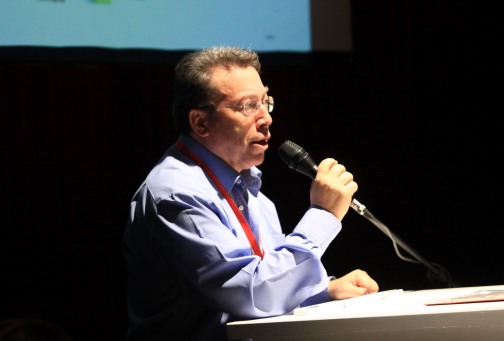
“Demonstrators always sit in the last row, they don’t want anyone on their back,” said Noam Semel, General Director of the Cameri Theatre in Tel Aviv, as he addressed the members of the European Theatre Convention (ETC) on the set of “Oh God!” where a recent performance had been disrupted as part of the ongoing heated debate over performing in Ariel. The ETC convened in Israel for the first time this year, despite calls to boycott Israel, and those who participated were able to experience for themselves the complex, contradictory and often confrontational reality that is Israel, and Israeli theatre.
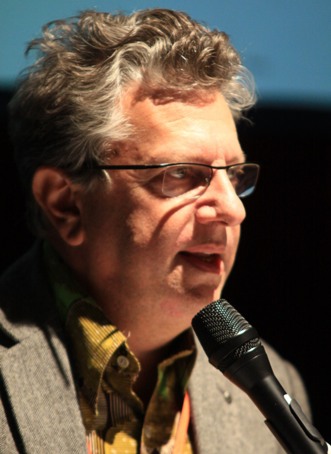
Founded in 1988, the ETC is a theatre advocacy network that promotes all aspects of theatre, access to culture, artistic exchange and intercultural dialogue and encourages cooperation between theatres and cultures. The group’s events took place from October 28 – 31, and included tours of Jerusalem, Ramallah and Jenin in addition to lectures, discussion sessions, and attending several plays at the Cameri. Based on my impressions from the first day of meetings on Friday, October 29, 2010, the conference offered many opportunities for exchange of ideas, and abundant material for reflection. The theme for this year’s meeting was “Multilingualism in Theatre” and the event itself was multilingualism in action as representatives from 17 different countries gathered in Cameri 5 – the theatre’s new rehearsal space. Jean Claude Berutti, ETC President and Artistic Director of La Comedie de Saint-Etienne addressed the assembly in French, while others chose English as their mode of communication, while simultaneous translation made the discussions accessible to all.
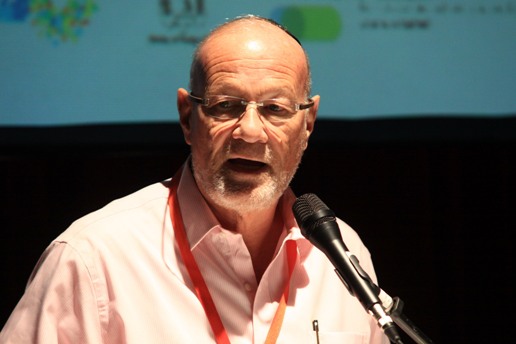
The sessions began with Professor David Alexander’s talk on “Political Satire of the Israeli Theatre,” an excellent introduction to this strange place, Israel. Describing Israel as a country where “everything is reconstructed as satire,” he spoke of Hanoch Levin’s satiric works, including “Queen of the Bathtub” performed at the Cameri Theatre in 1970. Although the text itself might be perceived as “lukewarm” according to Alexander, the review provoked extreme reactions at the time, as on the stage, “people night after night dared to call to change the outcome of the 1967 war.” Taken off the stage after only 19 performances, and “never again produced on the Israeli stage,” as Alexander said, “the play became a symbol for years to come.” Alexander expressed the main tenet of Levin’s political satires: “we have become a society that readily sacrifices its children…we have sanctified the term of loss…we are proud at being one big bereaved family.”
Alexander said that “Israel is a paradise for satirists” where “freedom of speech prevails” and “even prime time TV is dedicated many times to satiric programs.” Alexander compared this ability to criticize events as they are happening to the Greek satire of Aristophanes -“written at a time of war against war,” commenting, that it “says something about us as a society, the strength and effectiveness of our theatre and culture as a whole.”
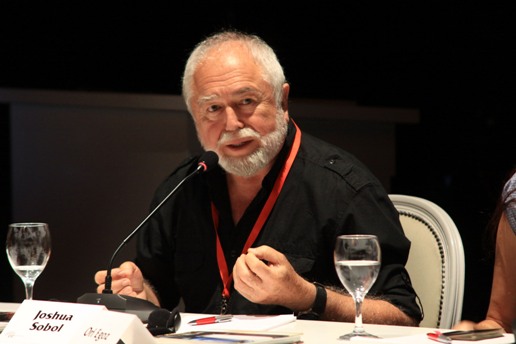
Alexander’s talk was followed by a panel discussion of the current controversy – whether Israeli theatres should perform in Ariel, which is located beyond the green line. A letter was sent by prominent actors, playwrights and other members of the Israeli theatrical community to the Cameri and other Israeli theatres saying that they will refuse to perform at the new cultural center in Ariel. The ensuing conversation gave the visitors a sense of the vitality of debate in Israel. Participating in the discussion were playwright Joshua Sobol, who said “I was one of the first signators;” theatre director and lawyer Ori Egoz, who clarified some of the legal aspects and expressed the claim that people have “a universal right to see art;” playwright Edna Mazya, author of “Oh God!” who also signed the letter; and actor Yossi Garber, who is scheduled to perform in the play “Tuesdays with Morrie” in Ariel.
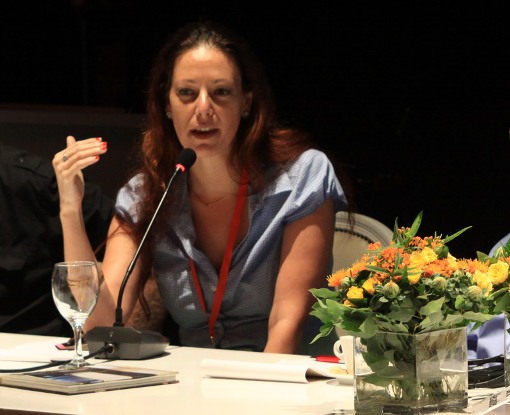
Cameri General Director Noam Semel provided background to the debate explaining that one of the guiding principles for cultural institutions in Israel is a commitment to equal access for all residents, whether they live near an urban center or in the periphery. As for the letter protesting performances in Ariel, Semel noted that until this event, actor Yossi Pollak was “the only one who said I don’t want to perform there…the only one who said it in advance, before signing a contract.”
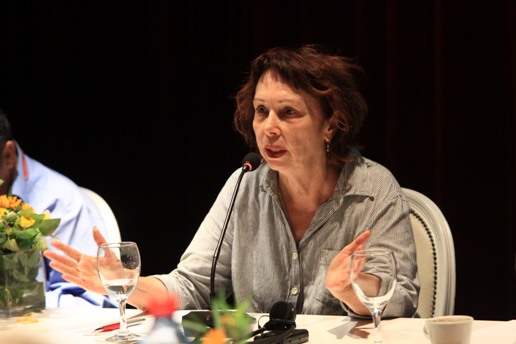
Despite her support of boycotting the cultural center in Ariel, Mazya said, “when I see all the world coming on top of us, boycotting us, I don’t accept that they will tell us what to do.” Garber embodies the complexity of the situation – as a member of the cast of Levin’s “Queen of the Bathtub” in 1970 he recalled, “I was spat upon…for 35 years no one said a word. It’s a good thing this came out.” Yet rather than boycott performing in Ariel, he advocated the use of theatre as an educational tool for change, saying “This is our weapon.”
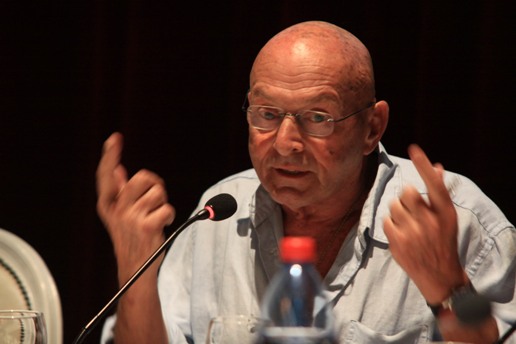
Sobol responded that “satire loses its effect, our country is saturated with satire…we do not have the illusion anymore that theatre is influential.” However, he added that “cultural boycotts on Israel strengthen the Israeli right [in their belief that] the entire world hates us, they are all anti-Semites…it’s counter effective and counter productive. But inside Israel we have to use that as an expression of not agreeing.” Ori Egoz compared performing in Ariel to performing in prisons, saying that while she may not agree with the behavior of the prisoners, who have been judged and found guilty of their actions, she still feels that they have a human right of access to culture. Sobol responded to this statement by saying, “If you define Ariel as a prison and the people who live there as criminals, I will perform there.”
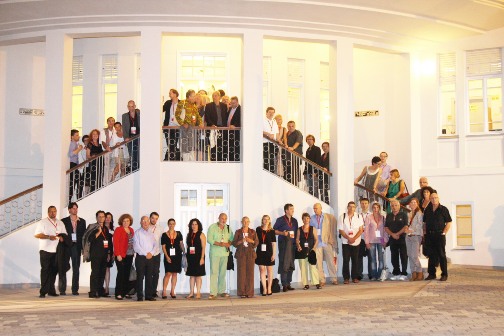
Moving from the present to visions of the future with “Multilingualism in the Theatre of the Future,” the tone took a more optimistic turn. The session was moderated by Dubravka Vrgoč, Vice president of the ETC, with the following speakers: Haris Pašović, Artistic director of the East West Theatre Company; Jean-Claude Berutti, President of the ETC; and Tomaž Toporišič, Dramaturge, Translator, Mladinsko Theatre Ljubljana.
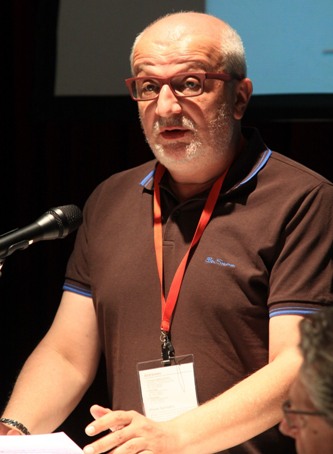
Haris Pašović, Director and founder of the East West Theatre Company in Sarajevo, described his recent ambitious venture into multilingualism, “Football, Football” which involved actors from seven different countries, speaking nine different languages. Pašović made a plea for intercultural exchange and representation for language minorities within the dominant cultural context, cautioning that “Europe becomes more and more racist.” Adding that the movies have made more progress than theatre in terms of incorporating multilingualism, Pašović gave a poignant example from the film “The Bubble” (Israel 2006, directed by Eytan Fox, written by Fox and Gal Uchovsky) – the scene where the Israeli Noam (Ohad Knoller) leaves a note for his Palestinian lover (Yousef Sweid) saying, “I’m sorry I don’t know how to say I love you in Arabic.” Pašović concluded by saying, “I am not a pacifist, I am not naïve. I am a survivor of the latest genocide in Europe, but I am an artist. Without utopia, without dreams we cannot move forward. I ask that we all learn the word love in all languages, at least while we are here.”
AYELET DEKEL





